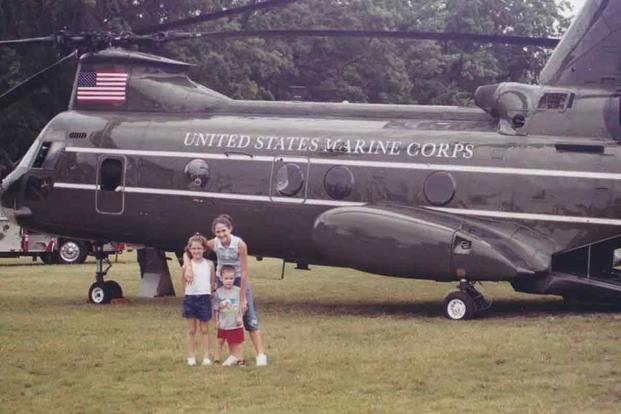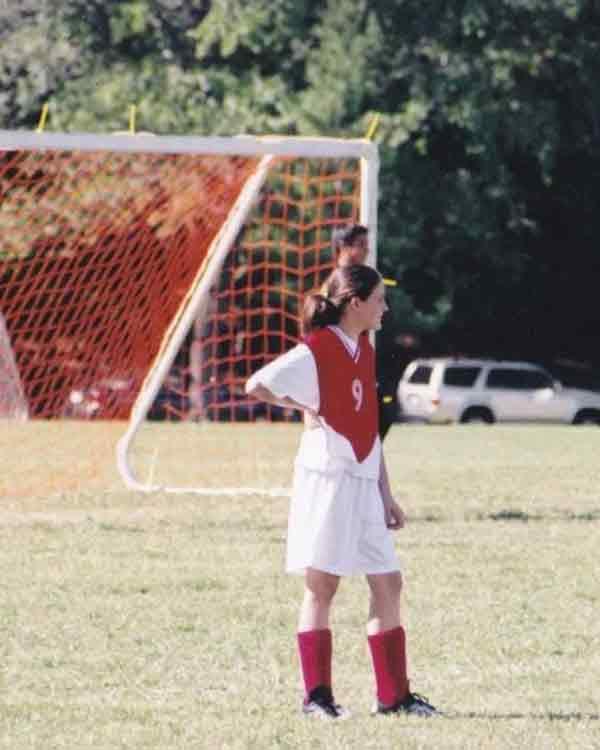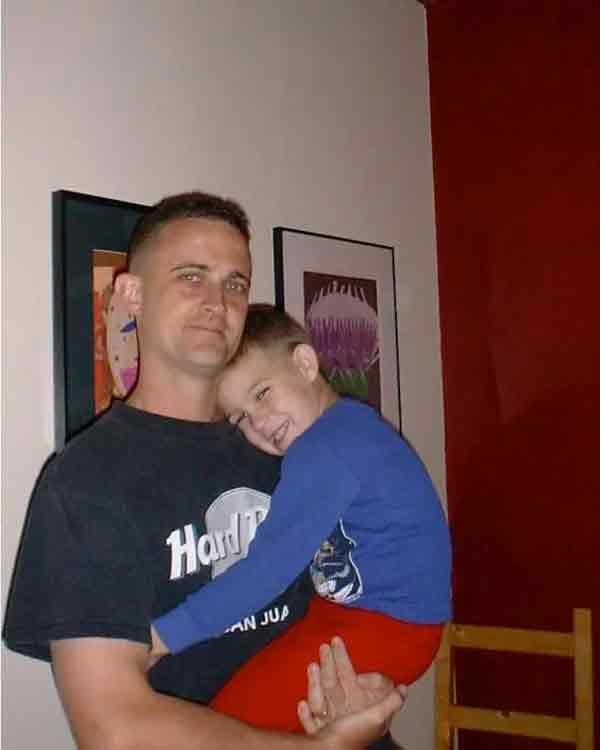This article first appeared on The War Horse, an award-winning nonprofit news organization educating the public on military service. Subscribe to their newsletter.
It sounded like gunfire. Unmoving and fully awake, I listened from my bed; our cat, Butler, burrowed into my side. It was definitely a machine gun. Our house sat half a mile inside the base’s main gate. My heart rate quickened and my mind raced. Were armed men running on foot toward us, my kids sleeping, blissfully unaware of the ongoing attack? I looked at the clock; it was after midnight. Tiptoeing to the kitchen window, I detected no foreign invaders, no neighbor executing defensive actions. It must be nothing, my brain looped, it must be nothing. I’d never been afraid to be alone, having lived much of my 13 years as a Marine Corps spouse that way.
I called my husband, Lee, who was in Hawaii on a trip as an assignments monitor. It was 6 p.m. his time. No answer. I didn’t leave the message: “Hey, I think we are being attacked. I wish you could do something about it from 4,800 miles away. Love you.” I tried again, then got back into bed. Eventually, although the gunfire continued, I fell asleep.
I felt sheepish the next day when I talked to Lee. The daylight made my fear seem ridiculous, and I was a bit embarrassed. He said it probably was simulated gunfire traveling across the water from training at Officer Candidates School. Apparently, that was a regular occurrence; I’d probably heard it many times—a background noise that usually went unnoticed but suddenly registered. The rotational orbit of my life had spiraled out of control due to a terrorist attack on our nation, and what once seemed unthinkable became possible.
We had moved to Quantico, Virginia, in July of 2001. The house was already inhabited by an extended family of daddy longlegs spiders, and the HVAC unit under the bedroom window sounded like a one-man band. The rooms were tiny, the flooring linoleum, and the ceilings peaked, made of wood painted dark brown. It had a sleepaway-camp cabin vibe. The stucco-sided duplex, off-white with little curb appeal, looked like the others on the street: a line of basic Monopoly houses turned this way and that, shared driveways dividing the otherwise uninterrupted strip of grass. Our neighbors were from Texas, France, Ohio, and Japan. We signed a document saying we understood the housing was substandard and were willing to live in it anyway.

We added paint, bought rugs, and hung kids’ artwork on the walls. We gathered in the front on Friday nights, circling our camp chairs and easing into the weekend. The kids played badminton and manhunt, created chalk drawings in the driveway, and ran around as kids do. The neighbors became friends, and the house became a home.
Six weeks later, as my two-year-old played at my feet, I watched two smoking towers on the Today show and wondered what was happening. Lee usually worked at a cubicle about a mile from our house, but that morning, he was at Henderson Hall, not far from the Pentagon. Later, as the neighborhood filled with kids who’d been pulled from school, my girls included, I stood in my front yard, talking with the neighbors in lowered voices, aware that the only air traffic above was the growl of F-16s. After an eight-hour commute for a 34-mile trip, Lee finally made it home, and we sat stunned.
The switch from peacetime flipped overnight. Tension was abuzz as war ramped up, even on a training base without deploying units. As a family, we had endured training, separations, and deployments. Lee had just returned from a six-month deployment to Okinawa the month before our move to Quantico. Our military life was comfortable and a bit sleepy if I’m honest. I had no reference for this abrupt change, like after we’d previously moved from Guantanamo Bay, Cuba, to Virginia in 1998 and then-four-year-old Rachel kept referring to pants as long shorts.
Every American old enough to remember has a 9/11 story. We trade tales of where we were and how we felt, reminiscing over fear. Stories are measured and judged by proximity to danger, death, and destruction. Those who lost the least are often the most eager to recount their tales, details of where and when. It’s a bit more complicated for military families.
The surface of our lives continued: Friday night gatherings, school awards ceremonies, Saturday morning soccer games, but the undercurrent of fear carried us along a moving sidewalk of uncertainty. One afternoon, the MP at my door said the 7-Day Store had received a bomb threat. Technically, we did not have to evacuate because the estimated blast zone stopped at the duplex next door. We spent the afternoon at the library.
The base threat level maxed out, requiring more than a base sticker and an ID check to get home. Some idiot tried to blow up a plane with bombs hidden in his shoes, our mail held the promise of possible death via anthrax, and I learned that Marines could deploy as individual augmentees, joining a unit elsewhere. I watched them be plucked like random cards from the magician’s deck: Chloe’s dad, Amanda’s husband, the assistant soccer coach, and so on. Although I understood that Lee’s job made this an unlikely possibility, it added to my unease.

Coverage of the hunt for Osama Bin Laden, footage of damage from airstrikes, and then the march to Baghdad filled the cable news hours. In our house, we stuck to Power Rangers, Lizzie McGuire, and Gilmore Girls, but underbreath discussions occurred on soccer field sidelines, after-school pickups, and waiting for library story times. Elisabeth came home one afternoon, fresh off the bus from middle school, and said that her friend, Kate, was upset and scared. Kate’s dad had recently deployed to Iraq, and to stay informed, maybe connected, the family TV was tuned to a daily war montage.
I consumed worry and fear like Coke and popcorn, trying to turn my eyes away from the movie screen and cover my kids’ faces. At the same time, politicians and the media talking heads made sad faces and took pictures, mainlining the drama.
Not unlike today, it was hard to know what was true and what was a good headline.
Military families surrender much of their destiny to an omniscient power; tokens moved across the game board. It’s what you signed up for, as many an old-timer will tell you. And yet, this fear, this uncertainty, felt both arbitrary and too close to home. Lee wanted to be plucked up and sent away like every other Marine I encountered. No one becomes a Marine to stay out of the war. It left me with no place to rest my head.

Every summer over the 3 1/2 years that we lived with the daddy longlegs, we watched new international neighbors proudly mount their flags at the doors of their substandard duplexes. An annual change of neighbors commenced: our friends’ homes transforming into someone else’s houses. Our girls practiced their growing “saying goodbye” muscles. Mostly, we felt the pull of war grow stronger and stronger. Lee did not deploy on that tour; deployments to Iraq and Afghanistan would come later.
Our nation is no longer at war. The house and the road we lived on no longer exist. They were demolished years later to create an entirely new neighborhood over the remnants of the old. The scope of my loss over the 20-plus years of war is amazingly small, and although we are among the lucky, my family’s life was irrevocably changed as soon as that first plane made contact. Military families, even those who didn’t give all, bear the scars of war, their sacrifices acknowledged superficially, not truly understood by a general public whose 9/11 experience can be summed up in a recital of hours, not decades.
The kaleidoscope through which we look at the truth has more mirrors than ever, and I still don’t know what’s true and what is a good headline.
Lee and I are the old-timers now, reminiscing over neighborhoods that no longer exist, measuring the hardships of our peers against anyone younger in an unwinnable contest of who had it worse. I know that I feel for military families living in uncertainty; sleepy is not an adjective that has ever been applied to their experience. Future conflicts will affect them more than they will affect me, and I will not tell them that’s what they signed up for.
This War Horse Reflection was edited by Kim Vo, fact-checked by Rosemarie Ho, and copy-edited by Mitchell Hansen-Dewar. Hrisanthi Pickett wrote the headlines.
Editors Note: This article first appeared on The War Horse, an award-winning nonprofit news organization educating the public on military service. Subscribe to their newsletter














